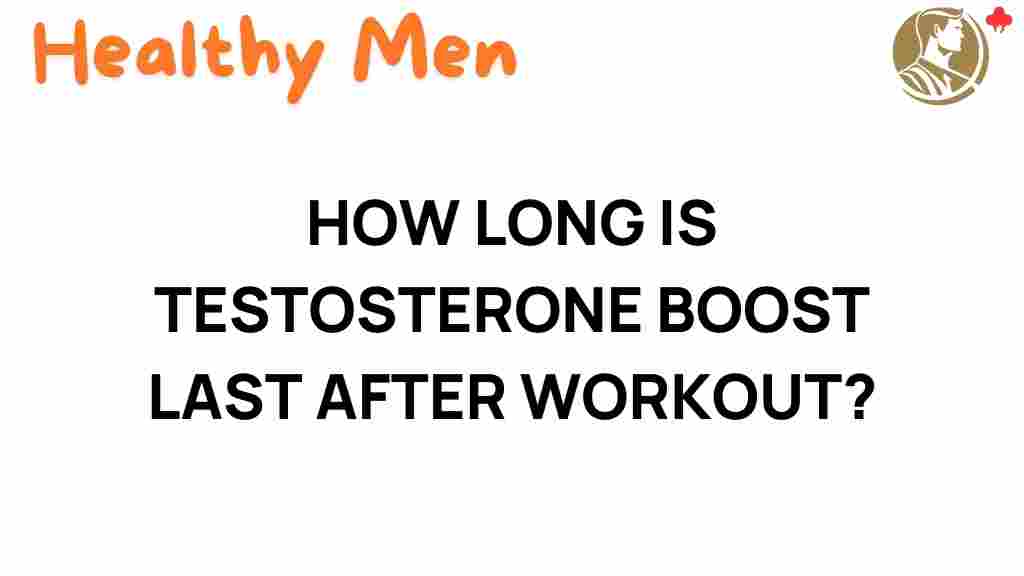Unveiling the Secrets: How Long Do Testosterone Boosts Last After Workouts?
When we think about fitness and achieving peak athletic performance, the discussion often turns to testosterone. This powerful hormone plays a vital role in muscle growth, recovery, and overall health. One of the most intriguing aspects of testosterone is how it fluctuates after workouts. Understanding how long testosterone boosts last after exercising can significantly impact your workout recovery, training strategies, and fitness goals. In this article, we’ll explore the hormonal changes associated with exercise, the effects of workouts on testosterone levels, and how you can optimize your routine for maximum benefits.
The Connection Between Exercise and Testosterone
Exercise is known to induce a variety of hormonal changes in the body, and testosterone is one of the key hormones affected. Testosterone levels can rise significantly during and after workouts, contributing to various physiological processes. Here’s a brief overview of how exercise influences testosterone:
- Increased Muscle Mass: Higher testosterone levels promote muscle growth, which is essential for anyone looking to improve their fitness.
- Improved Recovery: A testosterone boost post-workout aids in faster recovery, allowing you to train harder and more frequently.
- Enhanced Athletic Performance: Elevated testosterone levels can improve strength, endurance, and overall athletic performance, making your workouts more effective.
- Health Benefits: Maintaining optimal testosterone levels is linked to better metabolic health, mood regulation, and reduced risk of chronic diseases.
How Long Does a Testosterone Boost Last After Workouts?
The duration of a testosterone boost following a workout can vary based on several factors, including the type of exercise performed, the intensity of the workout, individual fitness levels, and hormonal baseline levels. Generally, here’s what you can expect:
- Immediate Boost: Testosterone levels typically spike during intense exercise sessions, particularly resistance training and high-intensity interval training (HIIT).
- Post-Workout Elevation: After a workout, testosterone levels can remain elevated for several hours, often peaking around 30 minutes to 2 hours post-exercise.
- Return to Baseline: Depending on individual factors, testosterone levels will gradually return to baseline levels within 24 to 48 hours after exercise.
Factors Influencing Testosterone Boost Duration
Several factors can influence how long your testosterone boost lasts after workouts, including:
- Type of Exercise: Resistance training typically leads to more substantial and lasting increases in testosterone compared to aerobic exercise.
- Intensity and Duration: Higher intensity workouts lead to more significant hormonal changes and longer-lasting boosts.
- Age and Gender: Younger individuals and males tend to experience more substantial testosterone responses to exercise than older adults or females.
- Nutrition: Proper nutrition before and after workouts can support testosterone production and recovery.
- Rest and Recovery: Adequate sleep and recovery time can help maintain higher testosterone levels and improve workout recovery.
Optimizing Your Workouts for Maximum Testosterone Boost
To maximize your testosterone boost after workouts, consider the following strategies:
- Incorporate Resistance Training: Focus on compound movements such as squats, deadlifts, and bench presses that engage multiple muscle groups.
- Utilize High-Intensity Interval Training: Include HIIT sessions in your routine to stimulate a more significant hormonal response.
- Maintain a Balanced Diet: Consume a diet rich in healthy fats, proteins, and micronutrients that support hormonal health.
- Prioritize Recovery: Ensure you get adequate sleep and allow time for muscle recovery between intense workouts.
- Stay Hydrated: Proper hydration supports overall health and can enhance workout performance and recovery.
Common Myths About Testosterone and Workouts
As with any topic, misconceptions about testosterone and workouts abound. Here are some common myths debunked:
- Myth 1: Only bodybuilders need to worry about testosterone levels.
Fact: Testosterone is crucial for all fitness enthusiasts, regardless of their goals. - Myth 2: You can only boost testosterone through supplements.
Fact: Natural methods like exercise and nutrition can effectively enhance testosterone levels. - Myth 3: Cardio workouts do not affect testosterone levels.
Fact: While resistance training has a more pronounced effect, intense cardio can also impact testosterone positively.
Potential Challenges and Troubleshooting Tips
While understanding testosterone boosts is essential, it’s also important to recognize potential challenges that may arise. Here are some troubleshooting tips:
- Low Testosterone Levels: If you consistently experience low energy or difficulty gaining muscle, consider consulting a healthcare provider to evaluate your hormone levels.
- Overtraining: Excessive exercise without adequate recovery can lead to decreased testosterone levels. Ensure you balance your workouts with rest days.
- Poor Nutrition: If you’re not fueling your body properly, it can hinder testosterone production. Focus on a well-rounded diet.
- Stress Management: High-stress levels can negatively impact testosterone. Incorporate stress-reducing practices like meditation and yoga into your routine.
Conclusion
Understanding how long testosterone boosts last after workouts is crucial for anyone serious about fitness, muscle growth, and athletic performance. By optimizing your workout routines and lifestyle choices, you can enhance your hormonal response to exercise, leading to better workout recovery and overall health benefits.
Remember that individual responses can vary, so it’s essential to listen to your body and adjust your approach as needed. For more insights on fitness and health, explore our resources on workout strategies and nutritional tips. If you’re interested in learning more about the effects of exercise on hormonal changes, check out this article.
By unveiling the secrets of testosterone and its impact on your workouts, you’re one step closer to achieving your fitness goals and enhancing your overall well-being.
This article is in the category Fitness and created by healthymen Team
